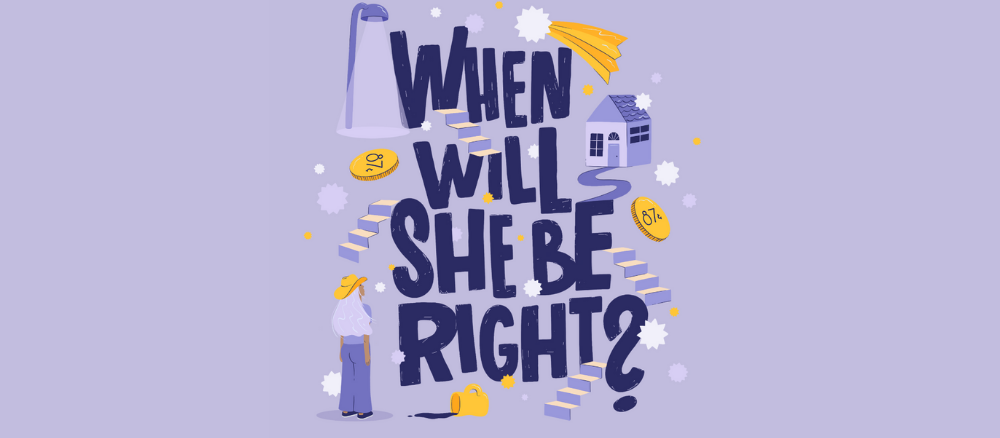
UN Women Australia (UNWA) launches new program to help bridge the gap in gender equality.
Australia has developed something of a global reputation over time. We’re seen as a laidback, optimistic and fearless bunch, rubbing shoulders with some of the most dangerous animals on the planet with a vegemite sandwich in hand, all the while shrugging our shoulders with a casual ‘’she’ll be right.”’
Aussies will always lend an ear to a mate and welcome visitors like family, but when it comes to gender equality, our relaxed, amiable nation is behind the eight ball. According to The Global Gender Gap Index 2020 that benchmarks gender gaps on economic, political, education, and health-based criteria, Australia currently ranks 44th and an alarming 38 places behind our New Zealand neighbours (6th on the Index).
‘When Will She Be Right?’, is a powerful new campaign from UNWA developed over the past few months. It focusses the spotlight firmly on gender inequality in Australia, with an ambition to change the status quo here and around the world. The initiative turns the popular Aussie idiom, “she’ll be right”, into a compelling question of not only how we will achieve gender equality, but also crucially, when. Launching this week, the campaign aims to rally the country to get behind the UN’s goal of achieving gender equality globally by 2030. The objective is to inspire and empower everyone to meaningfully connect with those around them and start conversations about the impacts of gender inequality in their own lives.
The UN’s Sustainable Development Goal #5 aims to achieve gender equality by 2030, yet according to the World Economic Forum, we will not reach equality for another 100 years. Shockingly, here at home, ‘she’ is still being paid 87 cents to the dollar. ‘She’ is also being murdered, one woman a week, at the hands of a man she knew and trusted and ‘she’ is still only the boss 18% of the time*. UN Women Australia wants to place women’s equality at the top of the agenda to accelerate efforts, so we can turn 100 years into 10.
“The ‘When Will She Be Right?’ campaign is the first in a series of initiatives UNWA plans to launch in an attempt to eradicate gender inequality. As with any movement galvanizing behavioral change, we believe it’s vital to co-create a plan of attack with a wide range of diverse stakeholders working in close consultation with community leaders and governments so we can truly deliver change through a ‘learn, share and act’ approach.” said Janelle Weissman, UNWA Executive Director.
UNWA want to encourage people to get involved from March 8 and beyond, by putting women first every day. People can help spread this message by sharing the campaign on their social channels tagging @unwomenaust and using #whenwillsheberight to talk about how inequality is an issue we can’t afford to be complacent about. People can also help by donating to UNWA, which funds work in our region and across the globe advocating for the rights of women and girls and implementing programs that expand women’s leadership, voices and participation at every level of society. ‘When Will She Be Right’ includes an impactful film and social assets will appear across UNWA social media channels and will be amplified via TV advertising and outdoor media.
“Gender equality is not only a basic human right, but its achievement has enormous socio-economic impacts. Empowering women fuels thriving economies, spurring productivity and growth. Still today gender inequalities remain deeply entrenched in every country in the world and is the biggest human rights issue of our time. If the status quo remains and it takes another 100 years to achieve targets, another six billion, nine hundred and thirty million girls will be born into an unequal world. That means your children, and your children’s children and even their children will not grow up in an equal world,” said Sunita Gloster, UNWA advisor.
“Women lack access to decent work, face occupational segregation and gender wage gaps and suffer violence and discrimination. They are under-represented in political and economic decision-making processes. By working in close consultation with community leaders and governments, UN Women collects and disseminates evidence to shape effective policies and programs. At the heart of this work is ensuring that everyone everywhere, regardless of gender, has the same opportunity. To lead, to learn, to earn a decent living, and to live a life free from violence and discrimination.”
SheSociety is a site for the women of Australia to share our stories, our experiences, shared learnings and opportunities to connect.

Leave a Reply